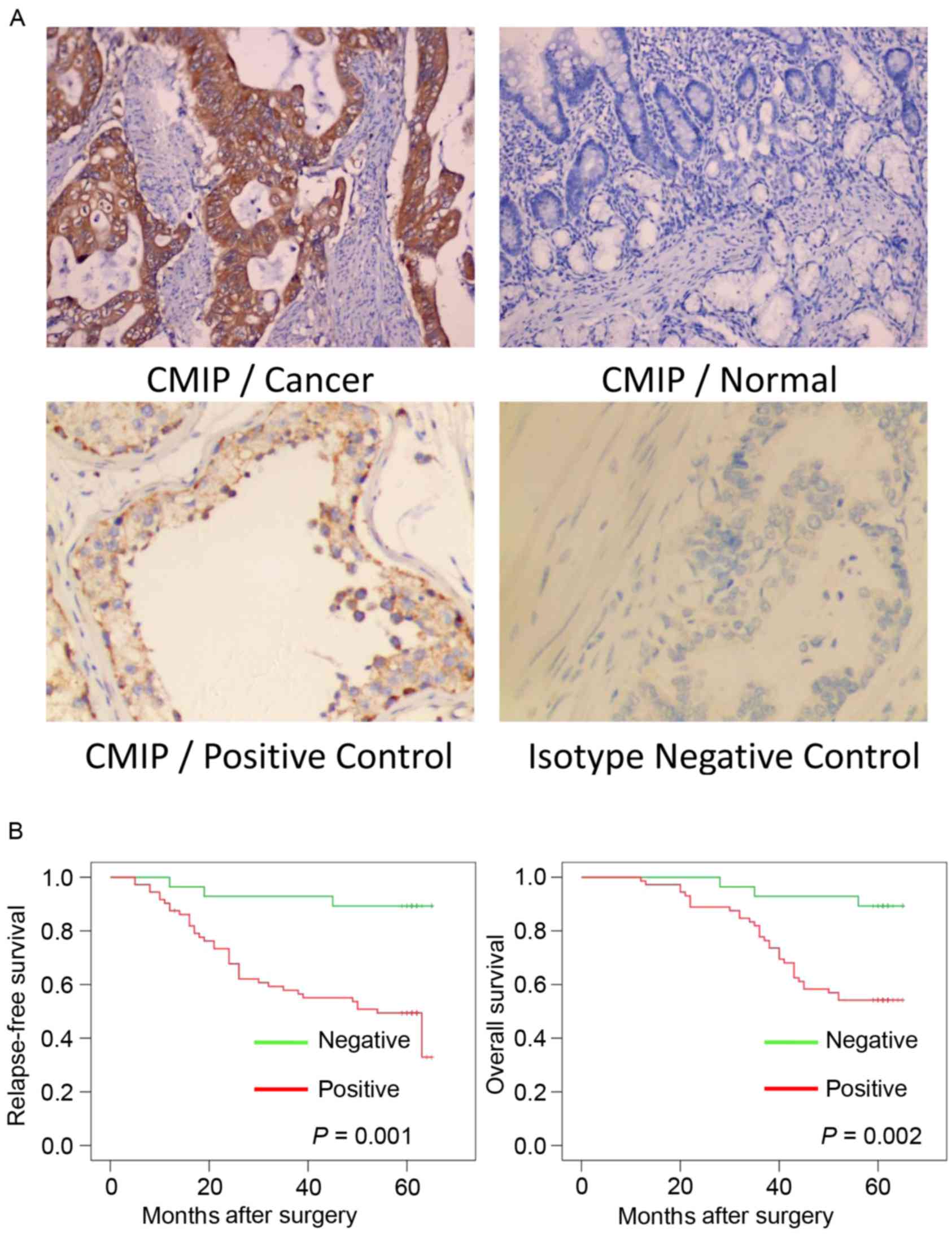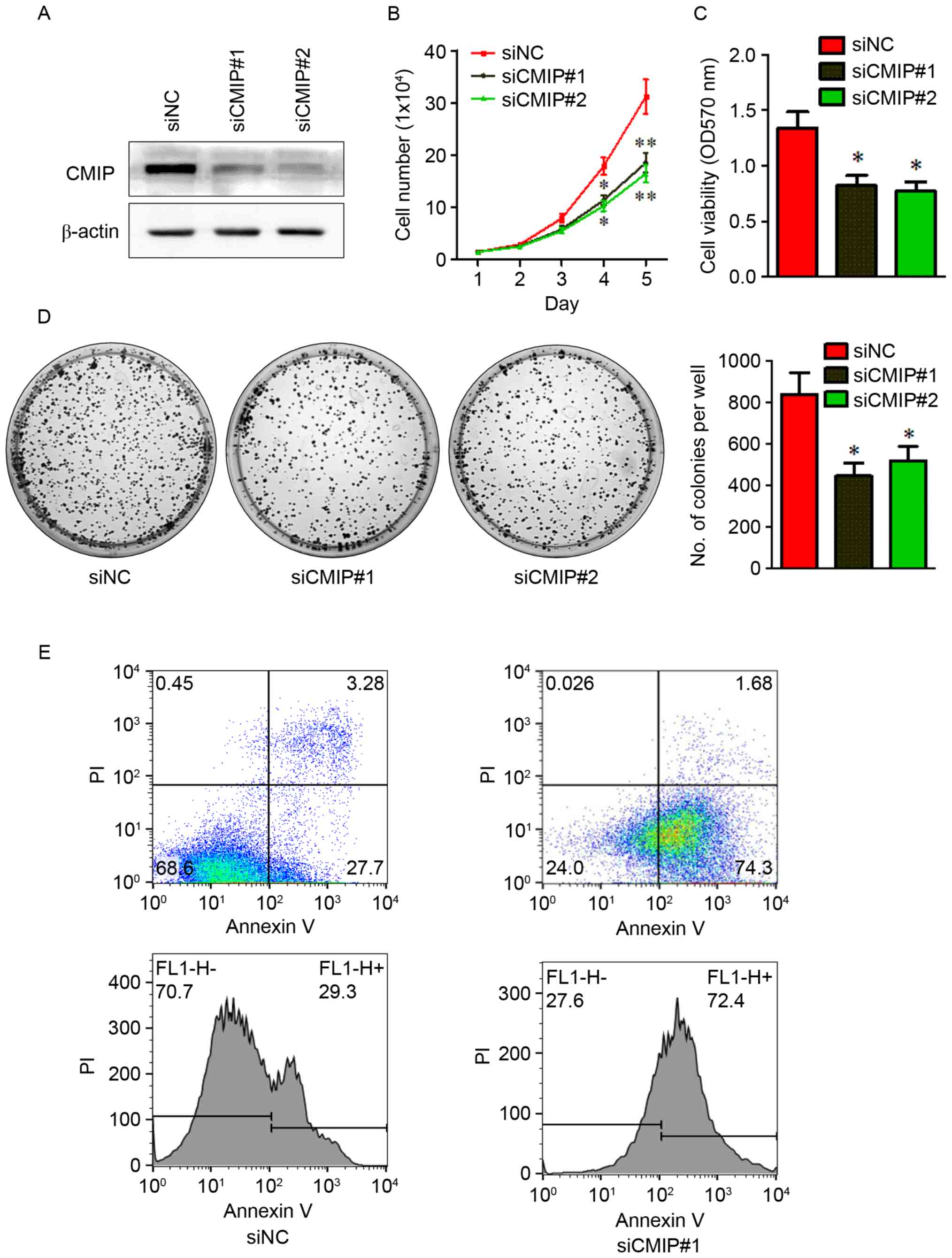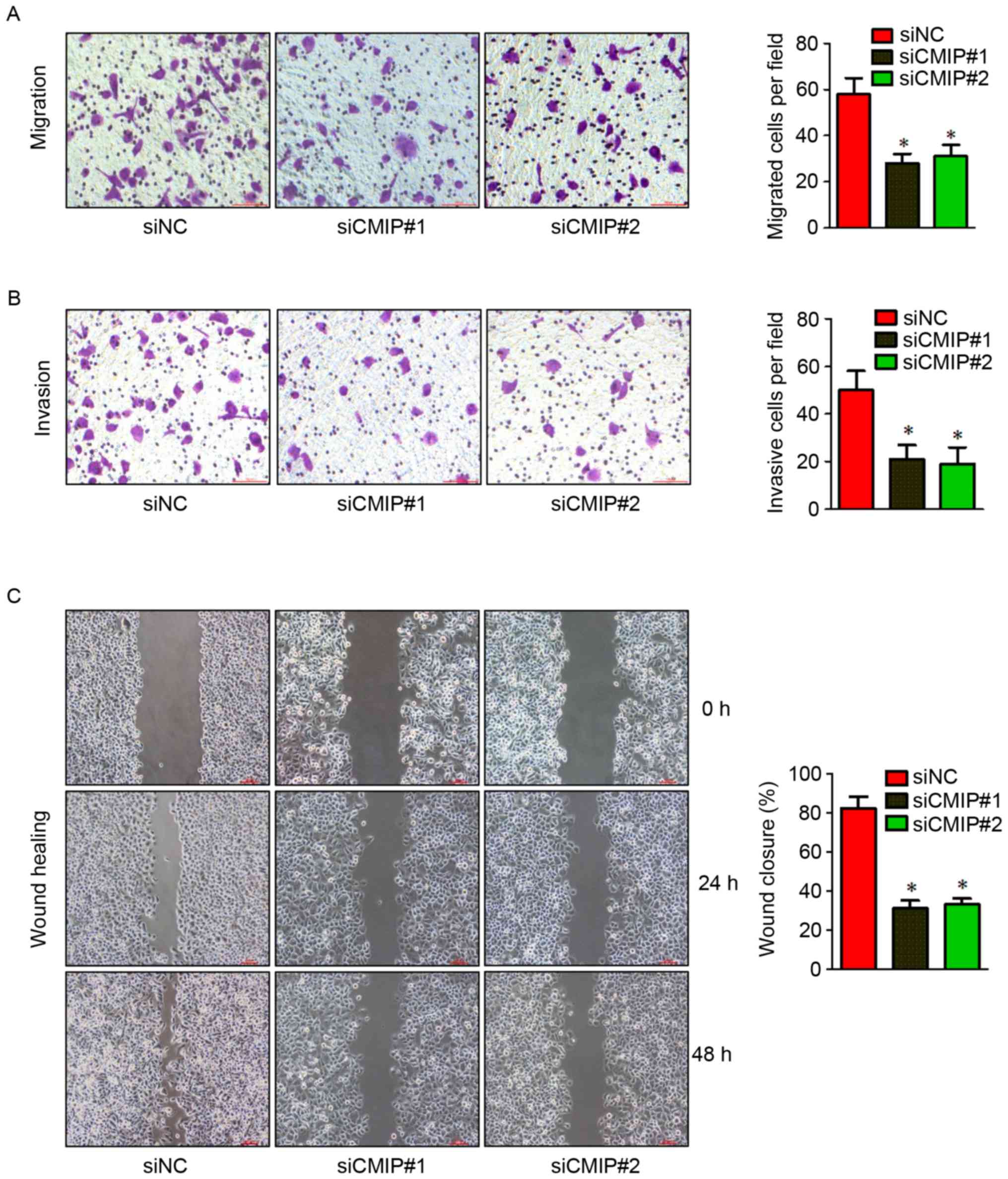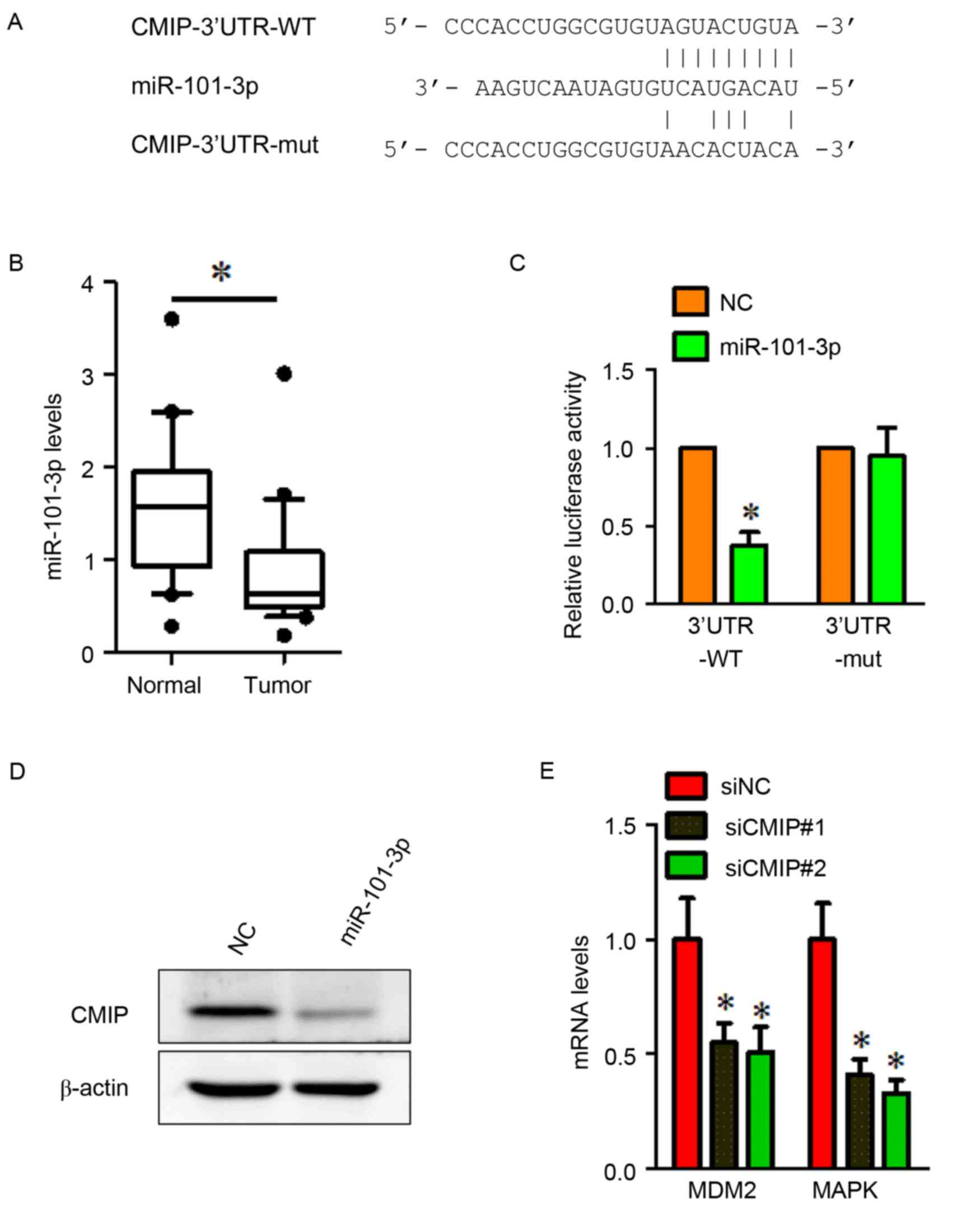|
1
|
Lee KB, Jin H, Ye S, Park BH and Kim SM:
Recombinant human bone morphogenetic protein-2 inhibits gastric
cancer cell proliferation by inactivating Wnt signaling pathway via
c-Myc with aurora kinases. Oncotarget. 7:73473–73485.
2016.PubMed/NCBI
|
|
2
|
Yin K, Liu M, Zhang M, Wang F, Fen M, Liu
Z, Yuan Y, Gao S, Yang L, Zhang W, et al: miR-208a-3p suppresses
cell apoptosis by targeting PDCD4 in gastric cancer. Oncotarget.
7:67321–67332. 2016. View Article : Google Scholar : PubMed/NCBI
|
|
3
|
Scott RB, Harrison J, Boulton C, Wilson J,
Gregory R, Parkin S, Bain PG, Joint C, Stein J and Aziz TZ: Global
attentional-executive sequelae following surgical lesions to globus
pallidus interna. Brain. 125:562–574. 2002. View Article : Google Scholar : PubMed/NCBI
|
|
4
|
Feng T, Sun L, Qi W, Pan F, Lv J, Guo J,
Zhao S, Ding A and Qiu W: Prognostic significance of Tspan9 in
gastric cancer. Mol Clin Oncol. 5:231–236. 2016. View Article : Google Scholar : PubMed/NCBI
|
|
5
|
Torre LA, Bray F, Siegel RL, Ferlay J,
Lortet-Tieulent J and Jemal A: Global cancer statistics, 2012. CA
Cancer J Clin. 65:87–108. 2015. View Article : Google Scholar : PubMed/NCBI
|
|
6
|
Zakko L, Lutzke L and Wang KK: Screening
and preventive strategies in esophagogastric cancer. Surg Oncol
Clin N Am. 26:163–178. 2017. View Article : Google Scholar : PubMed/NCBI
|
|
7
|
Van Cutsem E, Moiseyenko VM, Tjulandin S,
Majlis A, Constenla M, Boni C, Rodrigues A, Fodor M, Chao Y, Voznyi
E, et al: Phase III study of docetaxel and cisplatin plus
fluorouracil compared with cisplatin and fluorouracil as first-line
therapy for advanced gastric cancer: A report of the V325 Study
Group. J Clin Oncol. 24:4991–4997. 2006. View Article : Google Scholar : PubMed/NCBI
|
|
8
|
Murakami Y, Yatabe Y, Sakaguchi T, Sasaki
E, Yamashita Y, Morito N, Yoh K, Fujioka Y, Matsuno F, Hata H, et
al: c-Maf expression in angioimmunoblastic T-cell lymphoma. Am J
Surg Pathol. 31:1695–1702. 2007. View Article : Google Scholar : PubMed/NCBI
|
|
9
|
Benkhelifa S, Provot S, Nabais E, Eychéne
A, Calothy G and Felder-Schmittbuhl MP: Phosphorylation of MafA Is
essential for its transcriptional and biological properties. Mol
Cell Biol. 21:4441–4452. 2001. View Article : Google Scholar : PubMed/NCBI
|
|
10
|
Szymańska K, Szczałuba K, Lugowska A,
Obersztyn E, Radkowski M, Nowakowska BA, Kuśmierska K, Tryfon J and
Demkow U: The analysis of genetic aberrations in children with
inherited neurometabolic and neurodevelopmental disorders. Biomed
Res Int. 2014:4247962014. View Article : Google Scholar : PubMed/NCBI
|
|
11
|
Newbury DF, Winchester L, Addis L,
Paracchini S, Buckingham LL, Clark A, Cohen W, Cowie H, Dworzynski
K, Everitt A, et al: CMIP and ATP2C2 modulate phonological
short-term memory in language impairment. Am J Hum Genet.
85:264–272. 2009. View Article : Google Scholar : PubMed/NCBI
|
|
12
|
Grimbert P, Valanciute A, Audard V, Pawlak
A, Le Gouvelo S, Lang P, Niaudet P, Bensman A, Guellaën G and
Sahali D: Truncation of C-mip (Tc-mip), a new proximal signaling
protein, induces c-maf Th2 transcription factor and cytoskeleton
reorganization. J Exp Med. 198:797–807. 2003. View Article : Google Scholar : PubMed/NCBI
|
|
13
|
Audard V, Zhang SY, Copie-Bergman C,
Rucker-Martin C, Ory V, Candelier M, Baia M, Lang P, Pawlak A and
Sahali D: Occurrence of minimal change nephrotic syndrome in
classical Hodgkin lymphoma is closely related to the induction of
c-mip in Hodgkin-Reed Sternberg cells and podocytes. Blood.
115:3756–3762. 2010. View Article : Google Scholar : PubMed/NCBI
|
|
14
|
Liu Y, Su L, Lin Q, Han Y, You P and Fan
Q: Induction of C-Mip by IL-17 plays an important role in
Adriamycin-induced Podocyte damage. Cell Physiol Biochem.
36:1274–1290. 2015. View Article : Google Scholar : PubMed/NCBI
|
|
15
|
Ory V, Fan Q, Hamdaoui N, Zhang SY,
Desvaux D, Audard V, Candelier M, Noel LH, Lang P, Guellaën G, et
al: c-mip down-regulates NF-κB activity and promotes apoptosis in
podocytes. Am J Pathol. 180:2284–2292. 2012. View Article : Google Scholar : PubMed/NCBI
|
|
16
|
Scerri TS, Morris AP, Buckingham LL,
Newbury DF, Miller LL, Monaco AP, Bishop DV and Paracchini S:
DCDC2, KIAA0319 and CMIP are associated with reading-related
traits. Biol Psychiatry. 70:237–245. 2011. View Article : Google Scholar : PubMed/NCBI
|
|
17
|
Fletcher CDM, Unni KK and Meretens F:
Pathology and Genetics of Tumours of Soft Tissue and BoneWorld
Health Organization Classification of Tumors. IARC Press; Lyon:
2002
|
|
18
|
Ding K, Wu Z, Wang N, Wang X, Wang Y, Qian
P, Meng G and Tan S: MiR-26a performs converse roles in
proliferation and metastasis of different gastric cancer cells via
regulating of PTEN expression. Pathol Res Pract. 213:467–475. 2017.
View Article : Google Scholar : PubMed/NCBI
|
|
19
|
Capes-Davis A, Theodosopoulos G, Atkin I,
Drexler HG, Kohara A, MacLeod RA, Masters JR, Nakamura Y, Reid YA,
Reddel RR, et al: Check your cultures! A list of cross-contaminated
or misidentified cell lines. Int J Cancer. 127:1–8. 2010.
View Article : Google Scholar : PubMed/NCBI
|
|
20
|
Jiang T, Zhao B, Li X and Wan J: ARPP-19
promotes proliferation and metastasis of human glioma. Neuroreport.
27:960–966. 2016. View Article : Google Scholar : PubMed/NCBI
|
|
21
|
Ding ZY, Jin GN, Wang W, Chen WX, Wu YH,
Ai X, Chen L, Zhang WG, Liang HF, Laurence A, et al: Reduced
expression of transcriptional intermediary factor 1 gamma promotes
metastasis and indicates poor prognosis of hepatocellular
carcinoma. Hepatology. 60:1620–1636. 2014. View Article : Google Scholar : PubMed/NCBI
|
|
22
|
Livak KJ and Schmittgen TD: Analysis of
relative gene expression data using real-time quantitative PCR and
the 2(-Delta Delta C(T)) method. Methods. 25:402–408. 2001.
View Article : Google Scholar : PubMed/NCBI
|
|
23
|
Hurt EM, Wiestner A, Rosenwald A, Shaffer
AL, Campo E, Grogan T, Bergsagel PL, Kuehl WM and Staudt LM:
Overexpression of c-maf is a frequent oncogenic event in multiple
myeloma that promotes proliferation and pathological interactions
with bone marrow stroma. Cancer Cell. 5:191–199. 2004. View Article : Google Scholar : PubMed/NCBI
|
|
24
|
Nip H, Dar AA, Saini S, Colden M, Varahram
S, Chowdhary H, Yamamura S, Mitsui Y, Tanaka Y, Kato T, et al:
Oncogenic microRNA-4534 regulates PTEN pathway in prostate cancer.
Oncotarget. 7:68371–68384. 2016. View Article : Google Scholar : PubMed/NCBI
|
|
25
|
Bartel DP: MicroRNAs: Genomics,
biogenesis, mechanism, and function. Cell. 116:281–297. 2004.
View Article : Google Scholar : PubMed/NCBI
|
|
26
|
Yoo HI, Kim BK and Yoon SK:
MicroRNA-330-5p negatively regulates ITGA5 expression in human
colorectal cancer. Oncol Rep. 36:3023–3029. 2016. View Article : Google Scholar : PubMed/NCBI
|
|
27
|
Zhang Y, Peng Z, Zhao Y and Chen L:
microRNA-25 inhibits cell apoptosis of human gastric adenocarcinoma
cell line AGS via regulating CCNE1 and MYC. Med Sci Monit.
22:1415–1420. 2016. View Article : Google Scholar : PubMed/NCBI
|
|
28
|
Xin R, Bai F, Feng Y, Jiu M, Liu X, Bai F,
Nie Y and Fan D: MicroRNA-214 promotes peritoneal metastasis
through regulating PTEN negatively in gastric cancer. Clin Res
Hepatol Gastroenterol. 40:748–754. 2016. View Article : Google Scholar : PubMed/NCBI
|
|
29
|
Li W, Zhang J, Chen T, Yin P, Yang J and
Cao Y: miR-132 upregulation promotes gastric cancer cell growth
through suppression of FoxO1 translation. Tumour Biol. Aug
23–2015.(Epub ahead of print).
|
|
30
|
Wang Y, Zeng J, Pan J, Geng X, Li L, Wu J,
Song P, Wang Y, Liu J and Wang L: MiR-320a inhibits gastric
carcinoma by targeting activity in the FoxM1-P27KIP1 axis.
Oncotarget. 7:29275–29286. 2016. View Article : Google Scholar : PubMed/NCBI
|
|
31
|
Xu C, Li M, Zhang L, Bi Y, Wang P, Li J
and Jiang X: MicroRNA-205 suppresses the invasion and
epithelial-mesenchymal transition of human gastric cancer cells.
Mol Med Rep. 13:4767–4773. 2016. View Article : Google Scholar : PubMed/NCBI
|
|
32
|
Tsai MM, Huang HW, Wang CS, Lee KF, Tsai
CY, Lu PH, Chi HC, Lin YH, Kuo LM and Lin KH: MicroRNA-26b inhibits
tumor metastasis by targeting the KPNA2/c-jun pathway in human
gastric cancer. Oncotarget. 7:39511–39526. 2016. View Article : Google Scholar : PubMed/NCBI
|
|
33
|
Liu P, Ye F and Xie X, Li X, Tang H, Li S,
Huang X, Song C, Wei W and Xie X: mir-101-3p is a key regulator of
tumor metabolism in triple negative breast cancer targeting AMPK.
Oncotarget. 7:35188–35198. 2016. View Article : Google Scholar : PubMed/NCBI
|
|
34
|
Liu XY, Liu ZJ, He H, Zhang C and Wang YL:
MicroRNA-101-3p suppresses cell proliferation, invasion and
enhances chemotherapeutic sensitivity in salivary gland adenoid
cystic carcinoma by targeting Pim-1. Am J Cancer Res. 5:3015–3029.
2015.PubMed/NCBI
|
|
35
|
Sheng Y, Li J, Zou C, Wang S, Cao Y, Zhang
J, Huang A and Tang H: Downregulation of miR-101-3p by hepatitis B
virus promotes proliferation and migration of hepatocellular
carcinoma cells by targeting Rab5a. Arch Virol. 159:2397–2410.
2014. View Article : Google Scholar : PubMed/NCBI
|
|
36
|
Cui W, Wu R, Cao H, Gao J, Wang X and Ren
Q: P53 gene mutation and expression of MDM2, P53, P16 protein and
their relationship in human glioma. J Huazhong Univ Sci Technolog
Med Sci. 25:622–624, 635. 2005. View Article : Google Scholar : PubMed/NCBI
|
|
37
|
Danilovskyi SV, Minchenko DO, Moliavko OS,
Kovalevska OV, Karbovskyi LL and Minchenko OH: ERN1 knockdown
modifies the hypoxic regulation of TP53, MDM2, USP7 and PERP gene
expressions in U87 glioma cells. Ukr Biochem J. 86:90–102. 2014.
View Article : Google Scholar : PubMed/NCBI
|
|
38
|
Shen J, Niu W, Zhou M and Zhang H, Ma J,
Wang L and Zhang H: MicroRNA-410 suppresses migration and invasion
by targeting MDM2 in gastric cancer. PLoS One. 9:e1045102014.
View Article : Google Scholar : PubMed/NCBI
|
|
39
|
Wang BY, Cao J, Chen JW and Liu QY:
Triptolide induces apoptosis of gastric cancer cells via inhibiting
the overexpression of MDM2. Med Oncol. 31:2702014. View Article : Google Scholar : PubMed/NCBI
|
|
40
|
Saji S, Nakashima S, Hayashi S, Toi M,
Saji S and Nozawa Y: Overexpression of MDM2 in MCF-7 promotes both
growth advantage and p53 accumulation in response to estradiol. Jpn
J Cancer Res. 90:210–218. 1999. View Article : Google Scholar : PubMed/NCBI
|
|
41
|
Hai J, Sakashita S, Allo G, Ludkovski O,
Ng C, Shepherd FA and Tsao MS: Inhibiting MDM2-p53 interaction
suppresses tumor growth in patient-derived non-small cell lung
cancer Xenograft models. J Thorac Oncol. 10:1172–1180. 2015.
View Article : Google Scholar : PubMed/NCBI
|
|
42
|
Wei L, Li Y and Suo Z: TSPAN8 promotes
gastric cancer growth and metastasis via ERK MAPK pathway. Int J
Clin Exp Med. 8:8599–8607. 2015.PubMed/NCBI
|
|
43
|
Yang M, Gu YY, Peng H, Zhao M, Wang J,
Huang SK, Yuan XH, Li J, Sang JL, Luo Q and Huang C: NAIF1 inhibits
gastric cancer cells migration and invasion via the MAPK pathways.
J Cancer Res Clin Oncol. 141:1037–1047. 2015. View Article : Google Scholar : PubMed/NCBI
|
|
44
|
Zhao M, Howard EW, Parris AB, Guo Z, Zhao
Q and Yang X: Alcohol promotes migration and invasion of
triple-negative breast cancer cells through activation of p38 MAPK
and JNK. Mol Carcinog. 56:849–862. 2017. View Article : Google Scholar : PubMed/NCBI
|
|
45
|
Kim GT, Lee SH and Kim YM: Torilis
japonica extract-generated intracellular ROS induces apoptosis by
reducing the mitochondrial membrane potential via regulation of the
AMPK-p38 MAPK signaling pathway in HCT116 colon cancer. Int J
Oncol. 49:1088–1098. 2016.PubMed/NCBI
|
|
46
|
Peng W and Fan H: Long noncoding RNA CCHE1
indicates a poor prognosis of hepatocellular carcinoma and promotes
carcinogenesis via activation of the ERK/MAPK pathway. Biomed
Pharmacother. 83:450–455. 2016. View Article : Google Scholar : PubMed/NCBI
|
|
47
|
Yokozaki H: Molecular characteristics of
eight gastric cancer cell lines established in Japan. Pathol Int.
50:767–777. 2000. View Article : Google Scholar : PubMed/NCBI
|


















